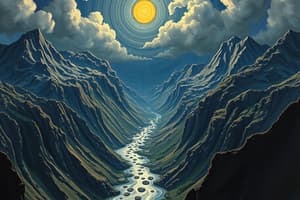Podcast
Questions and Answers
What is causing the Indian subcontinent to split into two parts?
What is causing the Indian subcontinent to split into two parts?
- Utilization of helium isotopes from hot springs
- Slow pace at which states are entering the Himalayas (correct)
- High frequency of earthquakes in the region
- Presence of magma beneath Tibet
Which Ayurvedic remedy is suggested for addressing chronic fatigue post-Covid pandemic?
Which Ayurvedic remedy is suggested for addressing chronic fatigue post-Covid pandemic?
- Ashwagandha
- Turmeric
- Shilajit (correct)
- Neem
What shaped the mountain ranges of the Himalayas around 100 million years ago?
What shaped the mountain ranges of the Himalayas around 100 million years ago?
- Unique plate splitting
- Presence of magma beneath Tibet
- Utilization of earthquake wave data
- Collision of Indian, Eurasian, and Shiroda plates (correct)
What geological event led to the process known as geologist delamination?
What geological event led to the process known as geologist delamination?
What did China's Ocean University study using earthquake wave data reveal about Tibet?
What did China's Ocean University study using earthquake wave data reveal about Tibet?
What has been observed regarding the splitting of tectonic plates in India?
What has been observed regarding the splitting of tectonic plates in India?
Flashcards are hidden until you start studying
Study Notes
- Research indicates that the Indian subcontinent is splitting into two parts, with Ladakh, Himachal Pradesh, Uttarakhand, Sikkim, Arunachal Pradesh, and some UP-like states facing the biggest threat.
- The slow pace at which states are entering the Himalayas is causing the plates to break, potentially leading to the disappearance of these states from the map of India.
- Geologists observed unique plate splitting in India, unlike any other tectonic plate globally, with the splitting occurring from the upper north.
- The region has experienced a high frequency of earthquakes, with an unusual number of earthquakes occurring in Tibet over a short period.
- Ayurvedic remedies like Shilajit are suggested for addressing chronic fatigue prevalent in India post-Covid pandemic.
- The formation of the Himalayas stems from the collision of three plates (Indian, Eurasian, and Shiroda plates) around 100 million years ago, shaping the mountain ranges we see today.
- Geologists utilized helium isotopes from hot springs to map the boundary between tectonic plates in Tibet, revealing thinning crust beneath Tibet and India.
- China's Ocean University conducted a study using earthquake wave data, identifying the presence of magma beneath Tibet and indicating a complex structure with a solid crust under the magma in the region.- Scientists hypothesized that a crack in the Indian plate in the Tibet region was filled with magma, leading to the process known as geologist delamination.
- The Indian plate is slowly moving into the Himalayas, with predictions that areas in the north of India will remain part of the country for thousands of years.
- The Himalayas are rising at a speed of 4 mm per year, but this continuous uplift may lead to instability and eventual collapse, rendering the region uninhabitable.
- Tectonic plate movements, despite causing destruction, played a crucial role in creating diverse environments that were essential for the evolution and flourishing of life on Earth.
- The evolution of life, including the development of birds from dinosaurs and human ancestors learning to walk on two legs, was influenced by the changing environments shaped by plate tectonics.
Studying That Suits You
Use AI to generate personalized quizzes and flashcards to suit your learning preferences.




